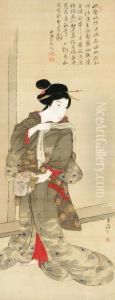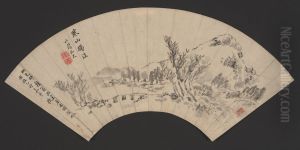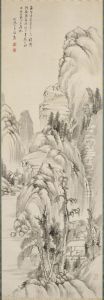Rai San'Yo Paintings
Rai San'Yo was a Japanese historian, Confucian scholar, and poet during the late Edo period. He was born on February 2, 1780, in Hita, which is now part of Oita Prefecture, Japan. His family was of samurai lineage and served the local lord of the Hita domain. Rai San'Yo, whose original name was Rai Shunsui, was well-educated in the Chinese classics and Confucian texts from a young age, a common practice among the samurai class to which he belonged.
Rai San'Yo is best known for his historical writings, particularly his work 'Nihon Gaishi' ('Unofficial History of Japan'), which criticized the Tokugawa shogunate's policies and the shogunate system itself. His writing was heavily influenced by the Chinese form of historiography and incorporated Confucian moral judgments on historical events and figures. 'Nihon Gaishi' was particularly significant in that it provided a critical perspective on the Tokugawa regime, contrasting with the officially sanctioned histories. This work, and others by Rai San'Yo, contributed to the intellectual underpinnings of the movement to restore imperial rule, which eventually culminated in the Meiji Restoration of 1868.
In addition to his historical works, Rai San'Yo was also involved in political activism. He was associated with the sonnō jōi movement, which advocated for the reverence of the Emperor and the expulsion of foreigners from Japan. His political beliefs ultimately led to his arrest and imprisonment in 1825. He spent several years in prison, during which time he continued to write poetry and historical commentary.
Rai San'Yo's influence extended beyond his death on October 14, 1832. His works continued to inspire Japanese nationalists and reformers throughout the 19th century. Today, he is remembered not only for his contributions to Japanese historiography but also for his role in the intellectual currents that shaped the modernization of Japan.




